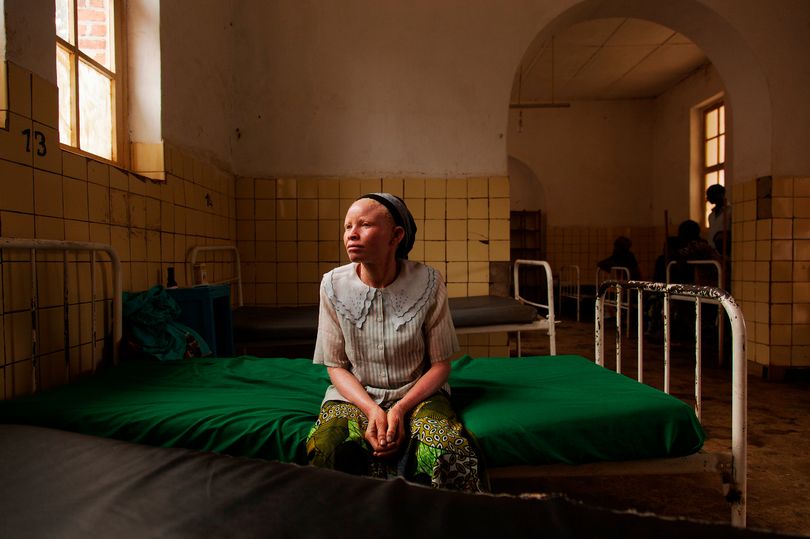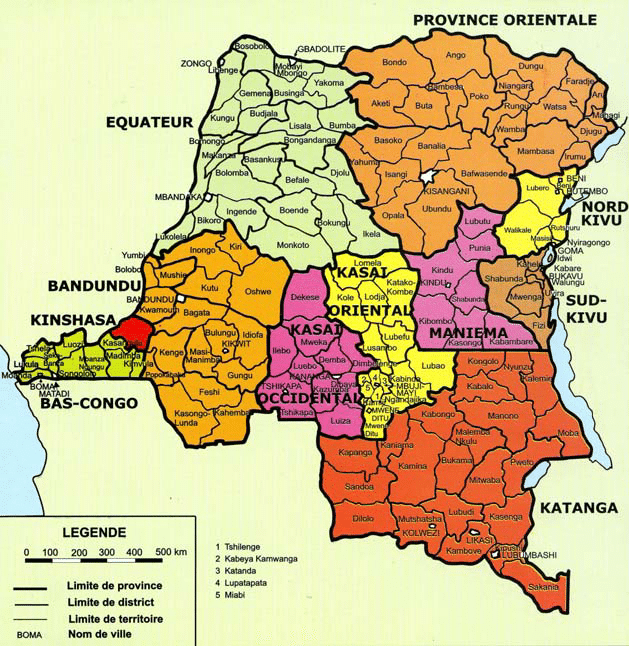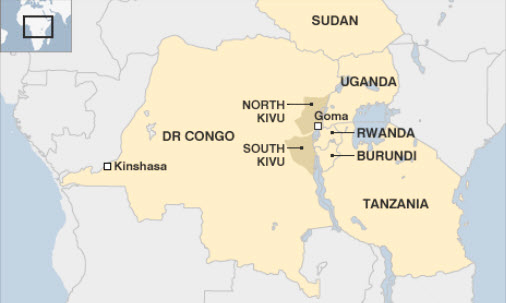With 2.4 million square kilometers, at least 250 ethnic and language groups and a total population of nearly 100 million people, the Democratic Republic of Congo (DRC) is one of Africa’s giants. The following map illustrates the real size of the DRC.

The number of people living with albinism in the DRC is unknown, but they are a vulnerable group, sometimes hunted down as animals, like in neighboring Central and Southern African countries. In the article below an albino woman, Lisa, narrates her story, how she escaped from being murdered. She was also sexually abused. Lisa lives in a remote area of South Kivu, an administrative region bordering Rwanda and Burundi. Much of the article focuses on sexual violence and unfortunately Lisa’s experiences are shared by many other women in the DRC.
People living with albinism are discriminated and enjoy even less protection from the State than other Congolese citizens. Superstition, witchcraft, lack of protection, human rights violations, ritual murder, sexual abuse. Read Lisa’s story and shiver. (webmaster FVDK).
Sex abuse survivor reveals kidnapper wanted to kill her and use her bones in witchcraft
Lisa – an albino who lacks pigmentation in her hair, eyes and skin – tells the Record how a man lured her away from home in the Congo so he could murder her and perform magic rituals with her remains.

Published: February 24, 2020
By: Daily Record UK – Stephen Stewart
He wanted to butcher her and use her bones in magic ceremonies.
Sexual abuse survivor Lisa – an albino who lacks pigmentation in her hair, eyes and skin – is quietly telling how a man wooed her, expressing his undying love before luring her away from home to murder her and perform rituals with her remains.
Her delicate features remain impassive as she recounts her horrific ordeal. Her condition – which affects the production of melanin, the pigment that colours skin, hair and eyes – can be a gruesome death sentence in the Democratic Republic of Congo.
The Daily Record and Sunday Mail have run a series of hard-hitting stories this week after we travelled there to uncover the reality for women in the country once dubbed the “rape capital of the world”.
According to the Home Office, 40 per cent of women in the area we visited – South Kivu – have suffered sexual violence.
Before she was kidnapped, Lisa had already suffered. The 22-year-old has one child born of rape. She was attacked when she was 18 as she worked in the fields around her village.
Often, women like Lisa have to be treated in poorly-equipped hospitals where doctors have to perform gynaecological surgery using the light of their mobile phones thanks to the frequent power cuts.
She said: “I was in the field working when I was raped. A man came and forced himself on me and I got pregnant. I gave birth to a boy. At first, when he was born, he was unwell but now he is fine and I love him very much.”
In DRC, there are many mothers who became pregnant after being attacked.
In the eyes of the law, their children do not exist but, thanks to SCIAF, Scotland’s Catholic international aid agency, they can now get a birth certificate, which gives them access to healthcare and education.

Lisa, who lives in a remote area of South Kivu, added: “Albino people like me are often discriminated against here. There are people who say that albinos can work magic. People point at me in the village and say bad things.
“One day, a man came to my village and he was very nice to me. He said he had fallen in love with me and he talked me into going on the bus with him to the city of Bukavu. He took me to a house and left me there.
“Another man came and asked me if I knew the other man. I had to admit that I didn’t really know him that well. It was then that he told me the other man was bad and trafficked albino people.
“He wanted to kill me and use my bones in witchcraft. I left as soon as I could and went back to my own village. Things are better now. I did not go to school and I can’t read or write but I would like my boy to study and do great things.”
Lisa has been supported by the generosity of Scottish people through SCIAF, which supports local projects promoting women’s rights, gender equality and provides services to the survivors of sexual and gender-based violence.
Gran Sylvia, 41, is another woman who has survived sexual abuse and is now receiving support through SCIAF.
She was abducted by rebel gangs and had to leave behind her two-month-old baby.
She was forced to become the “wife” of a rebel commander and was abducted for four years. During this time, her baby and mother had died and her husband had remarried.
She was left traumatised and now receives counselling, seeds, tools and training in how to grow food to feed the family and sell any surplus.
Sylvia said: “They made me walk and they hit me on the back with the butt of their guns. I left everything. If you said you were tired, they would say, ‘OK, you want to rest?’ and they would shoot you.
“I saw two people shot like this. We were all afraid. Those who refused to have sex were killed and their bodies fed to the pigs. I saw so many people die.
“This life was the worst.”
Thanks to the support of Scots through SCIAF, things have turned around. She added: “The counselling helped very much. After this, I still felt hurt but not as badly as before.
“I say, show me the one who brought this programme here and I could kiss them. Whenever I hear SCIAF is visiting, I feel happy.”
SCIAF funds medical care and surgery for women who have suffered sexual violence.
The rape epidemic means that doctors at Katana hospital are now world experts in fistula surgery despite the basic conditions.
Dr Michael Chanikire, 38, said: “When I work with these women, I think they could be my mother, wife or sister. It hurts to see people hurt in these ways. They are often traumatised by their suffering.
“I have worked in Europe and one of the main medical issues there is cancer but here we see a lot of fistula problems caused by the trauma of rape and sexual violence. There are times when we have no electricity and we have to use the lights on our mobile phones to perform surgery.
“Women fear coming here as there are many rebels in the area and they will know she has come for treatment and they know she will be asked about what has happened to her.
“Sometimes, it feels like we doctors have come through hell dealing with the things we have to do. It is rewarding too, though. My mother sees me wearing my white coat and she feels so proud of me.
“She knows I am doing my best to help women and that makes her very happy.”
Source: Sex abuse survivor reveals kidnapper wanted to kill her and use her bones in witchcraft

